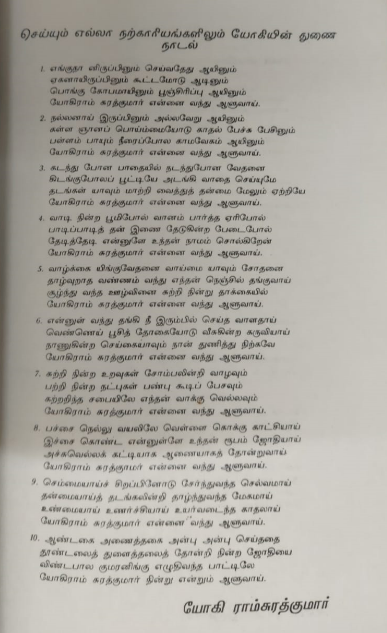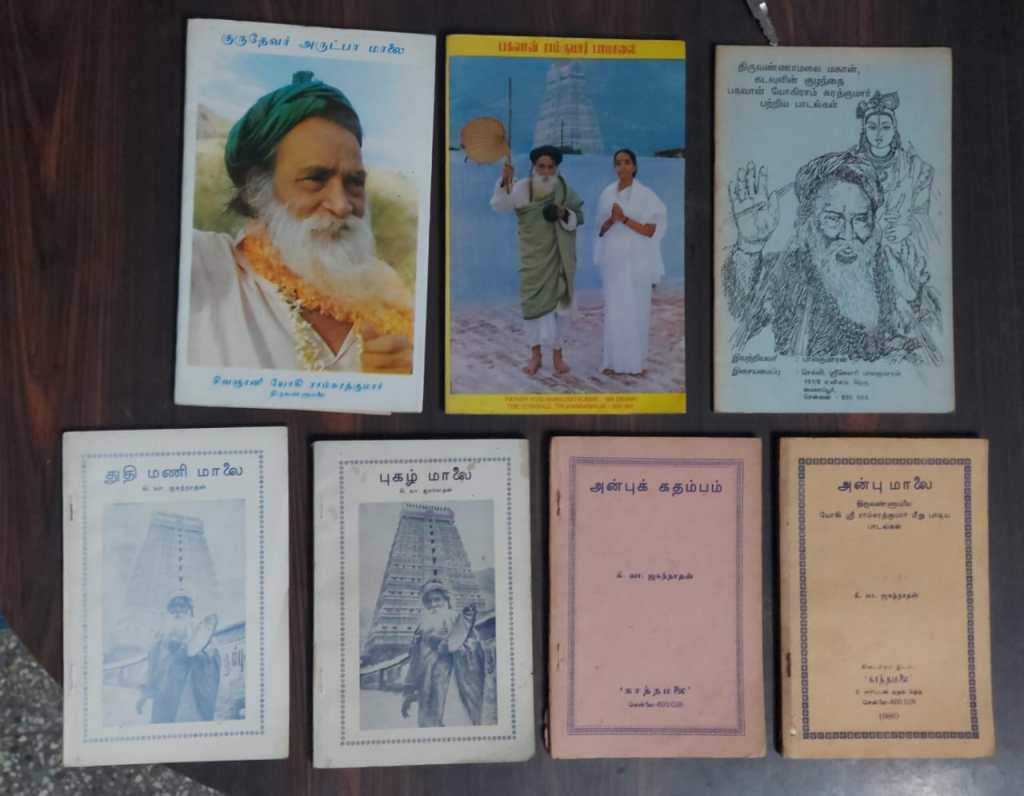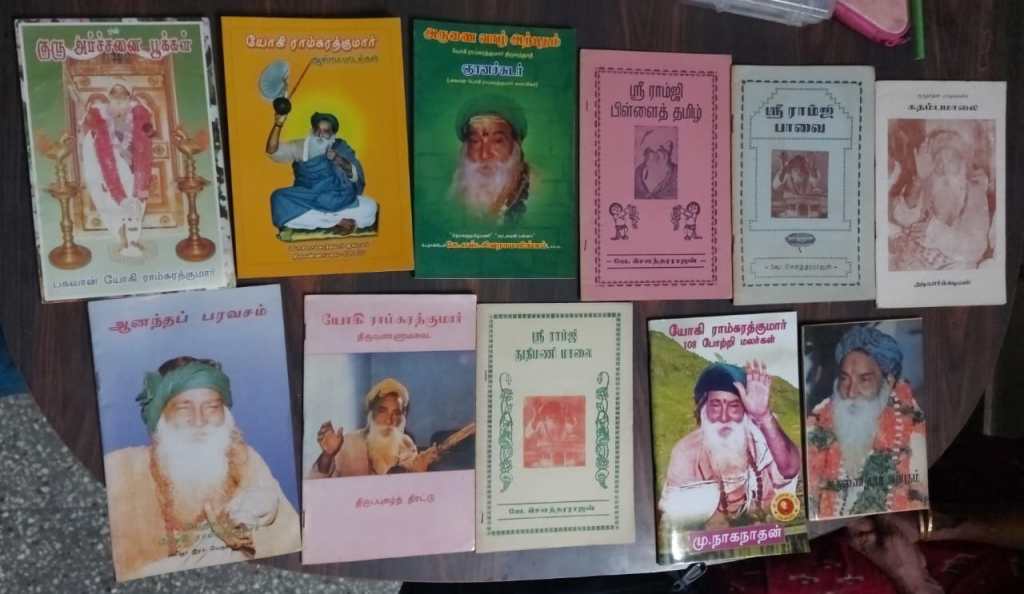
Song by Balakumaran – Yogi Ramsuratkumar yennai vandu aaluvaai




Here is the book review published in the last issue (Jan 2019) of Bhavan’s Journal on the books “Glimpses of a Great Yogi” and “Sparkles from Glimpses of a Great Yogi” by Sadhu Prof. V. Rangarajan.




You can download the entire book as a pdf file by clicking on this link – Garland of Praises on Yogi Ramsuratkumar by Truman Caylor Wadlington 2018
Written & Published by Sri Truman Caylor Wadlington; Sanskrit Translation by Smt. V.S. Saraswathy
रचयिता: ट्रूमन्-खेलर्-वाड्लिन्ग्टन्-महोदयः । संस्कृत-भाषान्तर-कर्त्री सरस्वती-वी-एस्-महोदया
Click the following link for the additional notes for Sanskrit Students, the transliteration in English and word-to-word meaning in English –
https://yogiramsuratkumarblog.wordpress.com/2018/11/07/book-garland-of-praises-stava-maalaa-caylor/


Written & Published by Sri Truman Caylor Wadlington; Sanskrit Translation by Smt. V.S. Saraswathy
रचयिता: ट्रूमन्-खेलर्-वाड्लिन्ग्टन्-महोदयः । संस्कृत-भाषान्तर-कर्त्री सरस्वती-वी-एस्-महोदया
Click here to download the PDF file with the full content of the original – the published book – https://yogiramsuratkumarblog.wordpress.com/2018/11/09/book-pdf-for-download-garland-of-praises-stava-maalaa-caylor/
Click the following link to download the PDF containing the contents of this page. i.e., the additional notes for Sanskrit Students, the transliteration in English and word-to-word meaning in English – Garland of Praises – Caylor – Additional Notes
—
योनयः = Origins (योनिः)
Salutations to thee, O Yogi Immortal, who descends from the effulgent sun, illumines the transcendent sky, and brings light into darkness.
With heart overflowing with adoration for thee, I humbly offer this garland of praises.
ॐ हत-ध्वान्त-दीपित-सर्वातिशायि-ख-तेजोमय-सूर्यावतारामर-योगिने ते नमः ।
भवद्भक्ति-परिप्लुत-हृदयस्त इमां स्तव-मालां नम्रतयार्पयामि ।। १ ।।
Om hata-dhvānta-dīpita-sarvātiśāyi-kha-tējōmaya-sūryāvatārāmara-yōginē tē namaḥ ।
bhavadbhakti-paripluta-hr̥dayasta imāṁ stava-mālāṁ namratayārpayāmi ।। 1 ।।
Salutations to thee, O Ancient Sage, dispatched from your heavenly abode to Arunachala, the all-purifying Mountain of Fire.
Transported by the bhaavaa of my longing, birth after birth, I follow you to this far realm.
om bhavaddivyāspadataḥ sarva-pāvakāgni-parvatārunācalaṁ prēṣita-sanātanarṣayē tē namaḥ ।
bhavatspr̥hā-bhāva-vaśānugō janmani janmanīmaṁ dūrastha-pradēśamanucarāmi ।। 2 ।।
ॐ भवद्दिव्यास्पदतः सर्व-पावकाग्नि-पर्वतारुनाचलं प्रेषित-सनातनर्षये ते नमः ।
भवत्स्पृहा-भाव-वशानुगो जन्मनि जन्मनीमं दूरस्थ-प्रदेशमनुचरामि ।। २ ।।
Om bhavaddivyāspadataḥ sarva-pāvakāgni-parvatāruṇācalaṁ prēṣita-sanātanarṣayē tē namaḥ |
bhavatspr̥hā-bhāva-vaśānugō janmani janmanīmaṁ dūrastha-pradēśamanucarāmi || 2 ||
Salutations to thee, O Son of Ramdas, who was liberated and transformed in the cosmic rapture of Lord Rama’s Name.
With faith unwavering, I anoint my body with the dust of your lotus feet.
ॐ प्रभु-राम-नाम-ब्रह्मानन्द-जीवन्मुक्त-विजात-रामदासात्मजाय ते नमः ।
ध्रुव-श्रद्धो भवत्-कमल-पाद-रेणुना मद्देहं लेपयामि ।। ३ ।।
om prabhu-rāma-nāma-brahmānanda-jīvanmukta-vijāta-rāmadāsātmajāya tē namaḥ ।
dhruva-śrad’dhō bhavat-kamala-pāda-rēṇunā maddēhaṁ lēpayāmi ।। 3 ।।
आयुधानि = Weapons (आयुधम्)
Salutations to thee, who wields the fan of palms like Lord Parashurama’s blade of righteousness to deflect evil and brighten vital airs.
Ever searching for hope and goodness on life’s path, it is you who shows me the way and ensures safe passage.
ॐ पाप-भ्रंशार्थ-प्राण-प्रभासनार्थ-ताल-वृन्त-श्रीपरशुराम-धर्म-फल-धराय ते नमः ।
सदा जीवन-पथे चीयमानाशा-सौजन्यो मार्गं दर्शयस्यभय-गतिं दृढी-करोषि ।। ४ ।।
om pāpa-bhranśārtha-prāṇa-prabhāsanārtha-tāla-vr̥nta-śrīparaśurāma-dharma-phala-dharāya tē namaḥ ।
sadā jīvana-pathē cīyamānāśā-saujan’yō mārgaṁ darśayasyabhaya-gatiṁ dr̥ḍhī-karōṣi ।। 4 ।।
Salutations to thee O Sovereign of Beggars, whose begging bowl spills over with the nectar of compassion.
Emptied of self-possession, I am blessed with your bountiful gifts.
ॐ उद्वृत्त-करुणामृत-भिक्षा-भाण्ड-पिण्डाराधिराजाय ते नमः ।
निरहंकृतस्ते भूर्युपायनैरनुगृहीतोऽस्मि ।। ५ ।।
Om udvr̥tta-karuṇāmr̥ta-bhikṣā-bhāṇḍa-piṇḍārādhirājāya tē namaḥ |
nirahaṅkr̥tastē bhūryupāyanairanugr̥hītō̕smi || 5 ||
Salutations to thee, O Victorious Yogi, who reduces to ashes karma’s taint in your handheld dhuni of fire and smoke.
Ensnared by the ceaseless allure of desire and fear, I am purified by your mystic fire.
ॐ भस्मीकृत-कर्म-दोषाग्नि-धूम-गर्भ-हवनी-पाणि-जिष्णु-योगिने ते नमः ।
अनवरत-काम-भयाकर्षण-पाश-बद्धस्ते गूढाग्निना पवित्री-क्रिये ।। ६ ।।
Om bhasmīkr̥ta-karma-dōṣāgni-dhūma-garbha-havanī-pāṇi-jiṣṇu-yōginē tē namaḥ ।
anavarata-kāma-bhayākarṣaṇa-pāśa-bad’dhastē gūḍhāgninā pavitrī-kriyē ।। 6 ।।
Salutations to thee, O Supreme Physician, whose pockets abound with the medicinal berries that relieve all maladies, even the plague of pride and ego.
Ailing from the ravages of sin, my suffering is assuaged by your remedies.
ॐ स्मयाहंकारादि-सर्वाधि-व्याधि-घ्नामलक-पूर्ण-कोष-परम-भिषजे ते नमः ।
भवद्भेषजोप-शान्तोऽघावमर्द-तप्तस्य मम क्लेशः ।। ७ ।।
Om smayāhaṅkārādi-sarvādhi-vyādhi-ghnāmalaka-pūrṇa-kōṣa-parama-bhiṣajē tē namaḥ |
bhavadbhēṣajōpa-śāntō̕ghāvamarda-taptasya mama klēśaḥ || 7 ||
Salutations to thee who carries Lord Rama’s mighty bow upright as a mendicant’s staff dispelling darkness and vanquishing ignoble demons.
With mortal vision entranced by maya’s dream, I am awakened by your grace.
ॐ हत-ध्वान्त-जिताधम-राक्षसोर्ध्व-भिक्षु-दण्ड-श्रीराम-महा-धनुर्धराय ते नमः ।
माया-स्वप्न-मूढ-मर्त्य-दृष्टिर्भवदनुग्रह-प्रबोधितोऽहम् ।। ८ ।।
Om hata-dhvānta-jitādhama-rākṣasōrdhva-bhikṣu-daṇḍa-śrīrāma-mahā-dhanurdharāya tē namaḥ |
māyā-svapna-mūḍha-martya-dr̥ṣṭirbhavadanugraha-prabōdhitō̕ham
guṇāḥ || 8 ||
Salutations to thee whose Name is the ark of benevolence, ferrying souls across samsara’s turbulent sea.
Powerless to resist the tidal currents of ever-becoming, I take refuge in the safe harbor of your holy Name.
ॐ संसार-क्षुब्धार्णवं तारित-जीव-कृपा-पोत-नामधेयाय ते नमः
नित्य-संभव-वेलाक्षमो भवत्पुण्य-नामधेयाभय-शरणं प्रपद्ये ।। ९ ।।
Om sansāra-kṣubdhārṇavaṁ tārita-jīva-kr̥pā-pōta-nāmadhēyāya tē namaḥ |
nitya-sambhava-vēlākṣamō bhavatpuṇya-nāmadhēyābhaya-śaraṇaṁ prapadyē || 9 ||
आकाङ्क्षा
Salutations to thee whose tattered garb cloaks your diamond-like radiance made lustrous in the fire of sacrifice.
When the truth is eclipsed by darkness, you open my eyes to the light within.
ॐ होमानल-धौत-चीर-वसनाच्छन्न-वज्र-तेजसे ते नमः ।
तमो-ग्रस्तर्ते म आविष्कृतान्तर्ज्योतिर्भवता ।। १० ।।
Om hōmānala-dhauta-cīra-vasanācchanna-vajra-tējasē tē namaḥ |
tamō-grastartē ma āviṣkr̥tāntarjyōtirbhavatā || 10 ||
Salutations to thee whose melodious voice is the root of mantra resounding in celestial spheres.
When I am transfixed by the thrill of your songs, enjoyment and peace blossom forth.
ॐ नित्य-घुष्ट-ख-गोल-मन्त्र-मूल-कल-कण्ठाय ते नमः ।
भवद्गीत-हर्ष-कीलित-प्रफुल्ल-प्रमोद-शमोऽहम् ।। ११ ।।
Om nitya-ghuṣṭa-kha-gōla-mantra-mūla-kala-kaṇṭhāya tē namaḥ |
bhavadgīta-harṣa-kīlita-praphulla-pramōda-śamō̕ham || 11 ||
Salutations to whose dance is ablaze with Nataraja’s all-consuming fire of bliss and benediction.
Filled with wonder by your glory, I bow down before you.
ॐ नटराजानन्दाशिस्सर्वभुगनल-ज्वलन्नटनाय ते नमः ।
भवत्तेजो-विस्मय-पूर्णस्ते पुरतो नमस्करोमि ।। १२ ।।
Om naṭarājānandāśis’sarvabhuganala-jvalannaṭanāya tē namaḥ |
bhavattējō-vismaya-pūrṇastē puratō namaskarōmi || 12 ||
Salutations to thee whose unbound mirth and laughter cut the knots of sorrow and pain.
When I call to you for help, you enfold me in your protective embrace and calm my troubled heart.
ॐ छिन्न-शोकार्ति-ग्रन्थ्यबद्ध-हासोल्लासाय ते नमः ।
मदनुग्रहार्थाहूतौ भवद्रक्षि-परिरम्भ-गुण्ठितोपशान्त-विह्वल-हृदयोऽहम् ।। १३ ।।
Om chinna-śōkārti-granthyabad’dha-hāsōllāsāya tē namaḥ |
madanugrahārthāhūtau bhavadrakṣi-parirambha-guṇṭhitōpaśānta-vihvala-hr̥dayō̕ham || 13 ||
Salutations to thee O Master of Pristine Wisdom, champion of the Ageless Dharma and protector of the Vedas.
Like the sun and moon, your supreme wisdom illuminates my world.
ॐ निर्मल-प्रज्ञानेश-सनातन-धर्म-गोप्तृ-वेदपाय ते नमः ।
विराजित-मल्लोक-भवत्परज्ञानं चन्द्रार्का इव ।। १४ ।।
Om nirmala-prajñānēśa-sanātana-dharma-gōptr̥-vēdapāya tē namaḥ |
virājita-mallōka-bhavatparajñānaṁ candrārkā iva || 14 ||
Salutations to thee who offered your “one-on-one ministry” to all who sat with you under the Punnai Tree and, later, gathered within your Sannidhi abode.
Bereft as I am of mantras and yantras, your gifts of faith and surrender alone sustain me.
ॐ पुंनागाध उपविष्टेभ्यो भवत्संनिधौ समवेतेभ्यो दत्त-संमुख-मन्त्राय ते नमः ।
मन्त्र-यन्त्र-हीनो भवद्दत्त-भक्ति-समर्पण-भृतोऽहम् ।। १५ ।।
Om punnāgādha upaviṣṭēbhyō bhavatsannidhau samavētēbhyō datta-sammukha-mantrāya tē namaḥ |
mantra-yantra-hīnō bhavaddatta-bhakti-samarpaṇa-bhr̥tō̕ham || 15 ||
Salutations to thee, O Guardian of Bharata Varsha, playground of rishis, saints and sages … and mad beggars too.
With fearless warriors arrayed against me on the Kurukshetra field, it is you, who takes the reins of my battle-worn chariot.
ॐ ऋषि-मुनि-प्रज्ञोन्मत्त-भिक्ष्वाक्रीड-भारत-वर्ष-गोप्त्रे ते नमः ।
मत्प्रतिकूलावस्थिताभय-योधे कुरुक्षेत्र इव मद्रण-क्लान्त-रथ-रश्मि-धृतो भवान् ।। १६ ।।
Om r̥ṣi-muni-prajñōnmatta-bhikṣvākrīḍa-bhārata-varṣa-gōptrē tē namaḥ |
matpratikūlāvasthitābhaya-yōdhē kurukṣētra iva madraṇa-klānta-ratha-raśmi-dhr̥tō bhavān || 16 ||
Salutations to thee who commands the procession of worlds even as you move a tea cup.
With senses dazzled by your unceasing wonders, I am summoned to bear witness to your heroic odyssey.
ॐ लोक-चषक-यात्रादेशिने ते नमः ।
भवदनवरताद्भुत-प्रतिहतेन्द्रियो भवत्पराक्रमं द्रष्टुमाहूतोऽहम् ।। १७ ।।
Om lōka-caṣaka-yātrādēśinē tē namaḥ |
bhavadanavaratādbhuta-pratihatēndriyō bhavatparākramaṁ draṣṭumāhūtō̕ham || 17 ||
Salutations to thee O Eternal Beloved, who is the embodiment of bliss shining, like the sun within the heart of all things.
With mind immersed in the rosary of your Name, I am cast adrift on the ocean of your all-pervading Presence.
ॐ आनन्द-मूर्ति-हृदिस्थ-शुभ्रार्क-नित्य-प्रियाय ते नमः
भवन्नामाक्ष-सूत्रे निमग्न-मना भवत्सर्व-व्यापि-संनिधौ प्लुतोऽहम् ।। १८ ।।
Om ānanda-mūrti-hr̥distha-śubhrārka-nitya-priyāya tē namaḥ |
bhavannāmākṣa-sūtrē nimagna-manā bhavatsarva-vyāpi-sannidhau plutō̕ham || 18 ||
ॐ योगि-राम-सुरत-कुमार जय गुरु-राय
Om Yogi Ramsuratkumar Jaya Guru Raya
For more details on this work and for other shlokas on Yogi Ramsuratkumar, Godchild, Tiruvannamalai, see https://yogiramsuratkumarblog.wordpress.com/category/shlokas-on-yogi/
योनय:
Verse 1.
ॐ हत-ध्वान्त-दीपित-सर्वातिशायि-ख-तेजोमय-सूर्यावतारामर-योगिने ते नमः
भवद्भक्ति-परिप्लुत-हृदयस्त इमां स्तव-मालां नम्रतयार्पयामि
Verse 2.
ॐ भवद्दिव्यास्पदतः सर्व-पावकाग्नि-पर्वतारुणाचलं प्रेषित-सनातनर्षये ते नमः
भवत्स्पृहा-भाव-वशानुगो जन्मनि जन्मनीमं दूरस्थ-प्रदेशमनुचरामि
Verse 3.
ॐ प्रभु-राम-नाम-ब्रह्मानन्द-जीवन्मुक्त-विजात-रामदासात्मजाय ते नमः
ध्रुव-श्रद्धो भवत्कमल-पाद-रेणुना मद्देहं लेपयामि
आयुधानि
Verse 4.
ॐ पाप-भ्रंशार्थ-प्राण-प्रभासनार्थ-ताल-वृन्त-श्रीपरशुराम-धर्म-फल-धराय ते नमः
सदा जीवन-पथे चीयमानाशा-सौजन्यो मार्गं दर्शयस्यभय-गतिं दृढी-करोषि
Verse 5.
ॐ उद्वृत्त-करुणामृत-भिक्षा-भाण्ड-पिण्डाराधिराजाय ते नमः
निरहंकृतस्ते भूर्युपायनैरनुगृहीतोऽस्मि
Verse 6.
ॐ भस्मीकृत-कर्म-दोषाग्नि-धूम-गर्भ-हवनी-पाणि-जिष्णु-योगिने ते नमः
अनवरत-काम-भयाकर्षण-पाश-बद्धस्ते गूढाग्निना पवित्री-क्रिये
Verse 7.
ॐ स्मयाहंकारादि-सर्वाधि-व्याधि-घ्नामलक-पूर्ण-कोष-परम-भिषजे ते नमः
भवद्भेषजोप-शान्तोऽघावमर्द-तप्तस्य मम क्लेशः
Verse 8.
ॐ हत-ध्वान्त-जिताधम-राक्षसोर्ध्व-भिक्षु-दण्ड-श्रीराम-महा-धनुर्धराय ते नमः
माया-स्वप्न-मूढ-मर्त्य-दृष्टिर्भवदनुग्रह-प्रबोधितोऽहम्
गुणाः
Verse 9.
ॐ संसार-क्षुब्धार्णवं तारित-जीव-कृपा-पोत-नामधेयाय ते नमः
नित्य-संभव-वेलाक्षमो भवत्पुण्य-नामधेयाभय-शरणं प्रपद्ये
Verse 10.
ॐ होमानल-धौत-चीर-वसनाच्छन्न-वज्र-तेजसे ते नमः
तमो-ग्रस्तर्ते म आविष्कृतान्तर्ज्योतिर्भवता
Verse 11.
ॐ नित्य-घुष्ट-ख-गोल-मन्त्र-मूल-कल-कण्ठाय ते नमः
भवद्गीत-हर्ष-कीलित-प्रफुल्ल-प्रमोद-शमोऽहम्
Verse 12.
ॐ नटराजानन्दाशिस्सर्वभुगनल-ज्वलन्नटनाय ते नमः
भवत्तेजो-विस्मय-पूर्णस्ते पुरतो नमस्करोमि
Verse 13.
ॐ छिन्न-शोकार्ति-ग्रन्थ्यबद्ध-हासोल्लासाय ते नमः
मदनुग्रहार्थाहूतौ भवद्रक्षि-परिरम्भ-गुण्ठितोपशान्त-विह्वल-हृदयोऽहम्
योगः
Verse 14.
ॐ निर्मल-प्रज्ञानेश-सनातन-धर्म-गोप्तृ-वेदपाय ते नमः
विराजित-मल्लोक-भवत्परज्ञानं चन्द्रार्का इव
Verse 15.
ॐ पुंनागाध उपविष्टेभ्यो भवत्संनिधौ समवेतेभ्यो दत्त-संमुख-मन्त्राय ते नमः
मन्त्र-यन्त्र-हीनो भवद्दत्त-भक्ति-समर्पण-भृतोऽहम्
Verse 16.
ॐ ऋषि-मुनि-प्रज्ञोन्मत्त-भिक्ष्वाक्रीड-भारत-वर्ष-गोप्त्रे ते नमः
मत्प्रतिकूलावस्थिताभय-योधे कुरुक्षेत्र इव मद्रण-क्लान्त-रथ-रश्मि-धृतो भवान्
Verse 17.
ॐ लोक-चषक-यात्रादेशिने ते नमः
भवदनवरताद्भुत-प्रतिहतेन्द्रियो भवत्पराक्रमं द्रष्टुमाहूतोऽहम्
Verse 18.
ॐ आनन्द-मूर्ति-हृदिस्थ-शुभ्रार्क-नित्य-प्रियाय ते नमः
भवन्नामाक्ष-सूत्रे निमग्न-मना भवत्सर्व-व्यापि-संनिधौ प्लुतोऽहम्
Bhagavadyōgi-rāma-surata-kumāra-stava-mālā
yōnaya:
Verse 1.
‘Om hata-dhvānta-dīpita-sarvātiśāyi-kha-tējōmaya-sūryāvatārāmara-yōginē tē namaḥ
bhavadbhakti-paripluta-hr̥dayasta imāṁ stava-mālāṁ namratayārpayāmi
Verse 2.
‘Om bhavaddivyāspadataḥ sarva-pāvakāgni-parvatāruṇācalaṁ prēṣita-sanātanarṣayē tē namaḥ
bhavatspr̥hā-bhāva-vaśānugō janmani janmanīmaṁ dūrastha-pradēśamanucarāmi
Verse 3.
‘Om prabhu-rāma-nāma-brahmānanda-jīvanmukta-vijāta-rāmadāsātmajāya tē namaḥ
dhruva-śrad’dhō bhavatkamala-pāda-rēṇunā maddēhaṁ lēpayāmi
āyudhāni
Verse 4.
‘Om pāpa-bhranśārtha-prāṇa-prabhāsanārtha-tāla-vr̥nta-śrīparaśurāma-dharma-phala-dharāya tē namaḥ
sadā jīvana-pathē cīyamānāśā-saujan’yō mārgaṁ darśayasyabhaya-gatiṁ dr̥ḍhī-karōṣi
Verse 5.
‘Om udvr̥tta-karuṇāmr̥ta-bhikṣā-bhāṇḍa-piṇḍārādhirājāya tē namaḥ
nirahaṅkr̥tastē bhūryupāyanairanugr̥hītō̕smi
Verse 6.
‘Om bhasmīkr̥ta-karma-dōṣāgni-dhūma-garbha-havanī-pāṇi-jiṣṇu-yōginē tē namaḥ
anavarata-kāma-bhayākarṣaṇa-pāśa-bad’dhastē gūḍhāgninā pavitrī-kriyē
Verse 7.
‘Om smayāhaṅkārādi-sarvādhi-vyādhi-ghnāmalaka-pūrṇa-kōṣa-parama-bhiṣajē tē namaḥ
bhavadbhēṣajōpa-śāntō̕ghāvamarda-taptasya mama klēśaḥ
Verse 8.
‘Om hata-dhvānta-jitādhama-rākṣasōrdhva-bhikṣu-daṇḍa-śrīrāma-mahā-dhanurdharāya tē namaḥ
māyā-svapna-mūḍha-martya-dr̥ṣṭirbhavadanugraha-prabōdhitō̕ham
guṇāḥ
Verse 9.
‘Om sansāra-kṣubdhārṇavaṁ tārita-jīva-kr̥pā-pōta-nāmadhēyāya tē namaḥ
nitya-sambhava-vēlākṣamō bhavatpuṇya-nāmadhēyābhaya-śaraṇaṁ prapadyē
Verse 10.
‘Om hōmānala-dhauta-cīra-vasanācchanna-vajra-tējasē tē namaḥ
tamō-grastartē ma āviṣkr̥tāntarjyōtirbhavatā
Verse 11.
‘Om nitya-ghuṣṭa-kha-gōla-mantra-mūla-kala-kaṇṭhāya tē namaḥ
bhavadgīta-harṣa-kīlita-praphulla-pramōda-śamō̕ham
Verse 12.
‘Om naṭarājānandāśis’sarvabhuganala-jvalannaṭanāya tē namaḥ
bhavattējō-vismaya-pūrṇastē puratō namaskarōmi
Verse 13.
‘Om chinna-śōkārti-granthyabad’dha-hāsōllāsāya tē namaḥ
madanugrahārthāhūtau bhavadrakṣi-parirambha-guṇṭhitōpaśānta-vihvala-hr̥dayō̕ham
yōgaḥ
Verse 14.
‘Om nirmala-prajñānēśa-sanātana-dharma-gōptr̥-vēdapāya tē namaḥ
virājita-mallōka-bhavatparajñānaṁ candrārkā iva
Verse 15.
‘Om punnāgādha upaviṣṭēbhyō bhavatsannidhau samavētēbhyō datta-sammukha-mantrāya tē namaḥ
mantra-yantra-hīnō bhavaddatta-bhakti-samarpaṇa-bhr̥tō̕ham
Verse 16.
‘Om r̥ṣi-muni-prajñōnmatta-bhikṣvākrīḍa-bhārata-varṣa-gōptrē tē namaḥ
matpratikūlāvasthitābhaya-yōdhē kurukṣētra iva madraṇa-klānta-ratha-raśmi-dhr̥tō bhavān
Verse 17.
‘Om lōka-caṣaka-yātrādēśinē tē namaḥ
bhavadanavaratādbhuta-pratihatēndriyō bhavatparākramaṁ draṣṭumāhūtō̕ham
Verse 18.
‘Om ānanda-mūrti-hr̥distha-śubhrārka-nitya-priyāya tē namaḥ
bhavannāmākṣa-sūtrē nimagna-manā bhavatsarva-vyāpi-sannidhau plutō̕ham
Book Title pages and Preface:
भगवद्योगि–राम–सुरत–कुमार–स्तव–माला
The Yogi Ramsuratkumar
GARLAND OF PRAISES
ॐ
रचयिता : ट्रूमन्–खेलर्–वाड्लिङ्ग्टन्–महोदयः
by
Truman Caylor Wadlington
संस्कृत–भाषान्तर–कर्त्री : सरस्वती–वी–एस्–महोदया
Translation into Sanskrit
by
Saraswathy V. S.
Published
by
Truman Caylor Wadlington
2072 S. Wolcott Court
Denver, Colorado, USA. 80219
ISBN-13: 978-0-692-16705-2
2018
Front Cover
Photo taken by the author in 1972
in the fields beyond the railroad tracks.
Back Cover
Untitled
A drawing by Yogi Ramsuratkumar in 1972
Preface
Long ago, when Yogi Ramsuratkumar still wandered freely around Arunachala,
I enjoyed seeking him out and presenting to him a garland of bright marigolds
along with, of course, a packet of his favorite cigarettes. Now, decades later,
like those simple flowers, this Garland of Praises is my offering to him who is
everywhere in the boundless heart of his Father’s Grace.
Throughout the vast sweep of Mother India’s history, Sanskrit hymns, called
“stotrams,” have been composed and sung in honor of Her spiritual luminaries.
While I have modeled the Yogi Ramsuratkumar Garland of Praises on that
classical form, I don’t mean to suggest that it is comparable to those literary
masterpieces; rather, only that I strive to use that age-old form to give voice to
some of the same undying sentiments.
Each of the garland’s 18 verses is in praise of an attribute of the Guru, and each
is an expression of gratitude for his grace to heal or comfort or protect or guide
us in the troubled circumstances of our lives. Whenever Yogi Ramsuratkumar
is remembered or summoned in this way, those who wish to keep him in their
hearts and minds discover that his nearness grows ever sweeter and more
wondrous.
Acknowledgment
I sincerely thank Saraswathy V. S. for translating this work into Sanskrit. Without her soulful contribution, this project could not have come to fruition. It is my prayer that in having these verses translated into Sanskrit…the fabled “language of the devas”…it can be sung in celebration of Him, even in devaloka, for all time.
Foot Notes:
1 bhava, भावः Meaning a deeply moving “emotion, sentiment, mood or mental state.”
2 Ramdas: Refers to Swami Ramdas (1884-1963) born Vittal Rao in Kerala state. Yogi Ramsuratkumar’s guru.
3 Lord Rama’s Name: Refers to the Ram Mantra. Om Sri Ram Jai Ram Jai Jai Ram. Rama was the 7th avatar of Vishnu. His legend was told in the Ramayana.
1 Parashurama: The 6th avatar of Vishnu and one of the seven rishis. He appeared
in the treta yuga as a warrior-saint armed with three celestial weapons, fore-
most of which was an axe or parashu.
2 karma, कर्म: Meaning “action, work or deed.” The spiritual principle of how cause and
effect shape future events.
3 dhuni, हवनी: Meaning a yogi’s ritual fire pit into which karmic attachments are offered
and burned to ashes. Referring here to the smoking of cigarettes for this purpose.
4 medicinal berries: Refers to amla fruit, from the Sanskrit “amalaki,” Indian gooseberry.
5 maya, माया: Broadly meaning “illusion,” the sense world of manifold phenomena held in
Vedanta to conceal the unity of absolute being.
1 Name: From nama, नाम, referring to the repetition of a sacred Name.
2 samsara, संसारः The soul, finding itself awash in the sea of samsara, strives to find release, or moksha, from it’s past karma, which forms the web of which samsara is comprised.
3 Nataraja: Sanskrit, meaning “Lord of the Dance.” This is one of the names of Siva. It is by Siva’s dance of bliss that all things…atoms and universes alike…are created, sustained and destroyed.
__________________
1 Dharma, धर्मः Meaning the principal that orders the universe, society or individual conduct. Referring to the sanatana dharma or “eternal order.”
2 Vedas, वेदाः Referring to the fourVedas which comprise the primary texts of Hinduism.
3 Punnai Tree: In Tamil folklore, the “tree that cures.” Referring here to the tree under which Yogi Ramsuratkumar counseled devotees.
8
4 Sannidhi, संनिधिः Meaning “nearness” or “nearness to the Lord.” Sannidhi Agraharam is the name of the street adjacent to the Arunachaleshwar Temple where Yogi Ramsuratkumar’s small house was located.
5 Bharata Varsha, भारत–वर्षः The ancient name for India as designated in numerous
sacred texts.
6 Kurukshetra, कुरुक्षेत्रम्: The name of the field on which Lord Krishna drove Arjuna’s
chariot into battle and dispensed the teachings of the Bhagavad Gita in the Hindu epic, the Mahabharata.
7 Jaya, जय: Meaning “be victorious.”
8 Raya, रायः Meaning “king” or “prince.”
For more details on this work and for other shlokas on Yogi Ramsuratkumar, Godchild, Tiruvannamalai, see https://yogiramsuratkumarblog.wordpress.com/category/shlokas-on-yogi/
Tamil Book – Karunai Mazhai – V. Kamalam
Released in October 2018 at Yogi Ramsuratkumar Ashram.




Tamil Book – Yogi Ramsuratkumar for Children – Siruvargalukku Yogi Ramsuratkumar
12 separate stories based on the life of Yogi Ramsuratkumar and the experiences of the author with Yogi Ramsuratkumar




![IMG_20180318_192328519[1]](https://yogiramsuratkumarblog.files.wordpress.com/2018/03/img_20180318_1923285191.jpg)
![IMG_20180318_175717784_LL[1]](https://yogiramsuratkumarblog.files.wordpress.com/2018/03/img_20180318_175717784_ll1.jpg)


Sparkles

